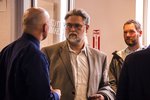

Even though it’s not an official budget year for the Washington State Legislature in 2020, talk among two of the three 20th Legislative District lawmakers focused around state revenues and taxes as part of a telephone town hall Tuesday, Feb. 25.
State Sen. John Braun, R-Centralia, and Rep. Ed Orcutt, R-Kalama, took questions from constituents across the district as part of the remote event. Chief among the topics discussed was how the state would fund its operations, especially given revenue forecasts that look higher than initially estimated, and whether or not Washington taxpayers might see some tax relief as a result.
Spurred by a question from one constituent about road conditions near Castle Rock, Braun dove into transportation funding issues as a whole. He said that overreliance on gas tax revenue for transportation funding was not sustainable, pointing to his proposal of using sales tax on motor vehicles, which currently goes into the state’s general operating budget, instead.
Braun’s plan would shift the revenue from the operating budget to transportation over 10 years, with him estimating over 20 years it could mean $16 billion into the budget. For reference, he brought up Connecting Washington legislation which used a nearly 12-cent gas tax increase to fund transportation projects for a similar figure.
Transportation funding was the subject of one of two poll questions a part of the town hall, with 92 percent of respondents agreeing with Braun’s plan on shifting sales tax revenues.
The legislators also addressed another issue related to the funding conversation, that of Initiative 976, a ballot measure that passed last year that among other changes would limit vehicle car tab fees to $30. One caller expressed concern over the initiative’s holdup in court, mentioning that some initiatives received legal challenges while others did not.
Orcutt had his own concerns over court rulings on voter initiatives, specifically around tax issues, referencing past times where measures similar to I-976 were approved by voters only to be shot down in court cases.
“I believe that the voters have voted three times for $30 car tabs, and the third time should have been the charm,” Orcutt said, adding he would like to see more momentum at the statehouse to push for a legislative solution, something similar to what was done to validate property tax increase limitations found in 2001’s Initiative 747.
Braun added that in the more than 30 years since Washington State had a Republican governor, most of the state Supreme Court justices were appointed by that individual, rarely facing re-election challenges.
“We have a judiciary that’s frankly biased in one direction,” Braun said, something he felt was “manifestly unfair” to the state population. He pointed to a recent judge’s ruling on I-976 that upheld the initiative as “good news,” but said it would take time — potentially years — to figure out.
The conversation shifted to property taxes, with Braun pointing to $1.5 billion more expected in state revenues since last April.
“There is no better time to make these kind of … tax reform changes to our law and get big dividends for the state of Washington,” Braun said, adding that “few things pay better from a public investment standpoint than transportation.”
Orcutt said the revenue forecast made it “very clear” to him that it was time for property tax relief, something respondents to the second poll question generally agreed with. When asked whether the $1.5 billion surplus should be used on some sort of that relief, 85 percent said “yes.”
Braun said that property tax cuts would be hard to see realized, as he said the current Democratic majority had been “unwilling” to talk about those reductions, pointing to 2017, the last time there was a Republican-based majority in the Senate. That year as part of the adjustments to K-12 education funding brought upon by the McCleary Supreme Court decision legislators put a cap on the amount school districts could collect on local levies, something that was adjusted higher after the Senate shifted to a Democratic majority.
Orcutt said there were a number of bills regarding property tax relief in the House Finance Committee, of which he is a ranking member, that he has been trying to convince committee chair Gael Tarleton, D-Ballard, for the bills to have a hearing.
Among other issues that included legislation on gun control, which both lawmakers were generally opposed to — and constituent concerns about salmon populations in the district, which legislators said they were sympathetic toward — the topic of Engrossed Substitute Senate BIll 5395, which deals with comprehensive sexual health education in public schools, came up.
The conversation was spurred by one caller who said of the hundreds who showed up in Olympia at a Feb. 20 hearing for the bill the vast majority were opposed to the legislation.
Orcutt said mandated sexual education had been an issue in the district and beyond, referencing Battle Ground Public Schools’ decision to drop required sex ed outside of a few situations from its curriculum. He said he was asked to sign onto the bill last year, but that he “ran from that bill as quickly as (he) good,” given what the bill would require.
“I think it’s pushing things on our kids that aren’t age-appropriate,” Orcutt remarked. If passed the curriculum brought on by the bill could be implemented for students as young as kindergarten, with proponents stressing that lessons would be appropriate to grade levels.
“Just to be clear, this is a terrible bill,” Braun added, mentioning the effort to stop the legislation from passing the Senate ultimately failed. He stressed his belief that a decision to take on such curriculum should remain with local control, not something at the state level.
“Even if you were going to consider these types of (lessons), these are absolutely the decisions that should be done locally by local school boards that can truly be influenced by parents talking to them,” Braun said.